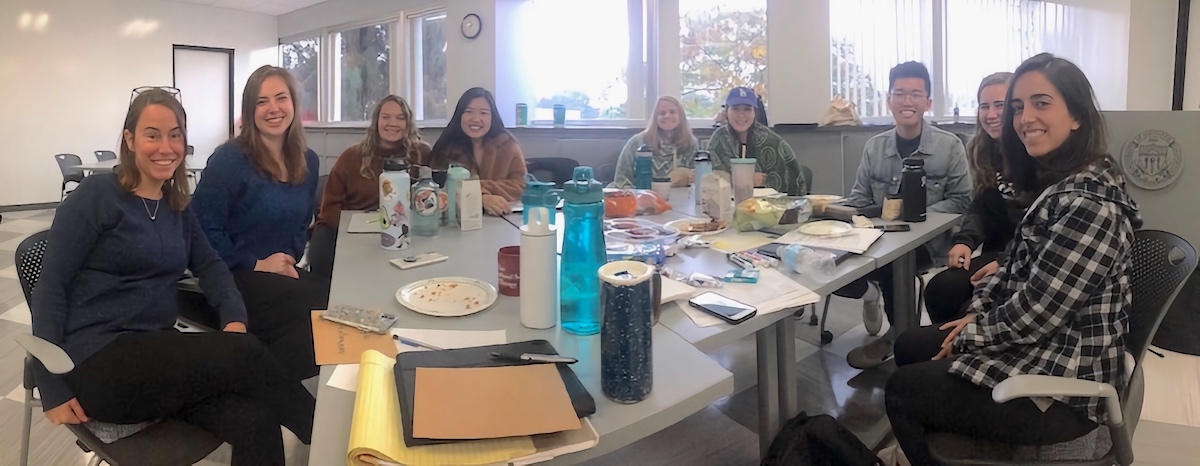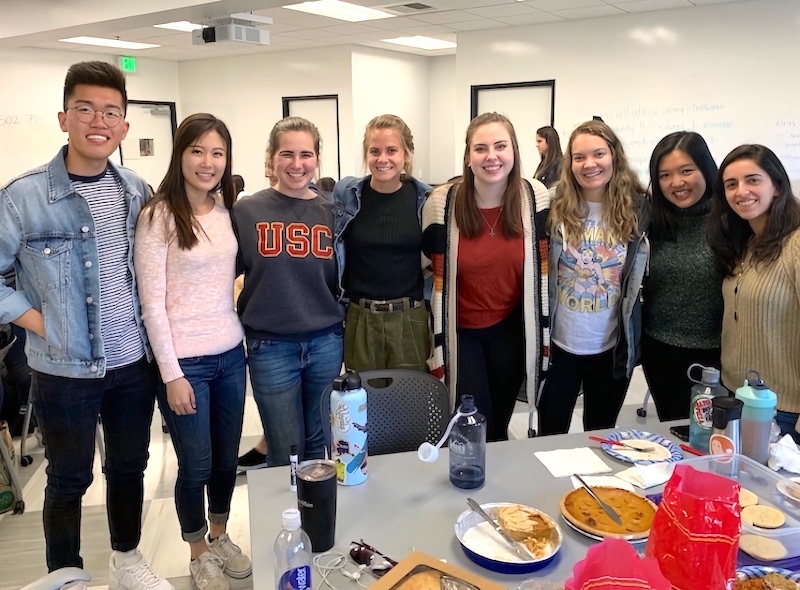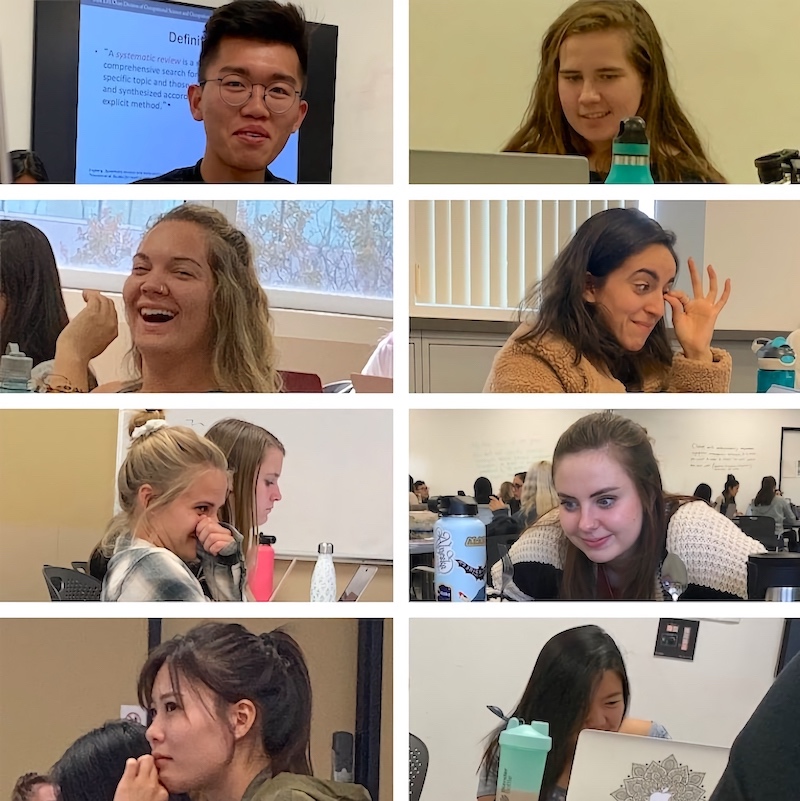Student Blog
Fieldwork
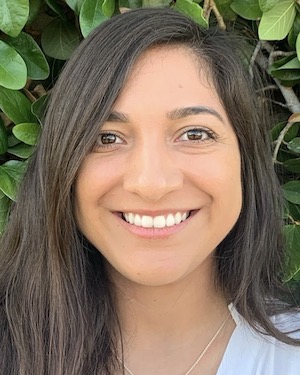
Week 1 of Level 2 Fieldwork: COMPLETE! ⟩
January 18, 2021, by Liz
Fieldwork
After a nice (and much needed) winter break, I was super excited to get back and start my first level II fieldwork. Don’t get me wrong, enjoying a nice cup of hot cocoa and binge watching Netflix was awesome! But, knowing that I would be completing my first level II in a hand therapy setting was so exciting. However, the pandemic definitely made me nervous to be back. But, I have to say I am absolutely in love with my site.
It is far from any ordinary hand therapy clinic! My site is a little bungalow right along the beach. It was once someone’s home in the 70s, then a craftsman’s shop, and now it is a homey place where people can come in for occupational therapy. I can see the ocean from the window — talk about a view! The OT that owns the clinic has also created a station out front on the porch which has been great for getting some fresh air. The clients really love it.
I spent the first two days getting familiar with the clinic and shadowing my fieldwork educator. By day 3 I was already helping out with some of the modalities such as ultrasound, paraffin, and ice massage (under appropriate supervision of course!). I also got a chance to try scar mobilization and also take some measurements. I have to say this first week has confirmed that I learned SO much in the hands electives. As Lisa Deshaies mentioned in our hand rehab course — anatomy is KEY. I really got a chance to see and understand what she meant this first week.
I also got a chance to see a bunch of different diagnoses such as Dupuytren’s contractures, swan neck and boutonniere deformities, trigger fingers, De Quervain’s tenosynovitis, and of course clients with rheumatoid and osteoarthritis — to name a few. We talked about a few of these in class, but it was great to be able to see them in person and also get a chance to feel people’s hands. We use gloves when doing so, but even through the use of gloves I have been able to feel the difference from person to person.
Overall, I was surprised by how much I knew! I definitely have more to learn, and I’ve established a few goals with my fieldwork educator. This week he wants me to help with a couple of evaluations. I am nervous, but looking forward to applying what I’ve learned about evals and also getting some feedback on how to improve. Wish me luck!
⋯
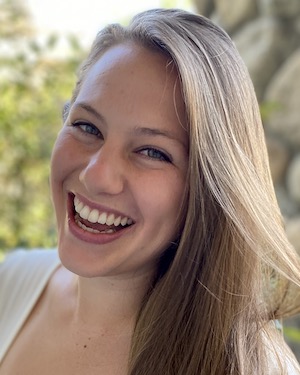
Interview with Pediatric OT Dani Lurie OTD, OTR/L ⟩
October 21, 2020, by Savi
Fieldwork
This weekend I got the opportunity to sit down with my sister Daniella Lurie OTD, OTR/L, or Dani Lurie, and learn more about her time at USC and her journey to becoming a pediatric occupational therapist. Throughout my lifetime I have had the privilege of accessing my sister’s life experiences and advice. These have been integral to my success as a current student and I thought it would be valuable to share some of her words of wisdom with you all! Dani graduated from USC Chan with her Doctorate in 2017 and has been working in pediatrics ever since. She currently works in a pediatric occupational therapy clinic and conducts treatment sessions both in person and through telehealth. Below you will find Dani’s responses to my questions. A huge shout-out to my biggest role model for taking the time to share her valuable insight with me and with all the future occupational therapists reading.
Why did you pick Occupational Therapy (OT)?
I have always been interested in working with people and was excited that OT combines both science and social science and focuses on mental and physical health. I volunteered in pediatric clinics during my undergraduate career at UCLA and that solidified my love for working with children and their families. All of my courses in college focused on developmental and abnormal psychology as well as statistics. I grew to love all of these subjects and was thrilled to realize how integrated all of these concepts were in OT. OT incorporates statistics into research and goal tracking, as you need to evaluate patients’ progress in a statistical manner. I enjoy that there is a quantitative reason for everything we do and there are science and research backing our treatment approaches and techniques. OT beautifully combines both my passion for science and my desire to work with people to help them achieve their goals.
Why did you choose to work in Pediatrics?
I worked with kids for my whole life. Whether it was tutoring, instructing dance classes, babysitting, or volunteering, I always found myself gravitating towards jobs that allowed me to work with children from high school onwards. I enjoy that children keep you grounded because they live in the present moment, whereas adults are always on the go thinking about what’s next. The goal for any type of work with kids is surrounding play and having fun. This emphasis was good for me emotionally, as it is therapeutic to surround yourself with people who focus on the present. It’s also really fun to play games all day and work on goals indirectly. Although I don’t consider myself the most creative person, I think working in pediatrics has stretched my imagination. I also enjoy working with parents because I get to utilize more of my psychology background from college by focusing on their mental health and their relationships with their children.
Why did you choose USC and how has that choice benefitted you after graduating?
It’s been really nice having students come from the program I went to because I can work to build their skills from a perspective of understanding. The Chan division has provided me with a nice network of people with common interests and pursuits. I decided to go to USC because the professors are outstanding, especially for my specific focus area interests. Dr. Erna Blanche has been the biggest inspiration for my whole career, and I am so grateful to have had her as a mentor and teacher. All of my Sensory Integration (SI) and pediatrics professors, including Dr. Joan Surfus and Dr. Janet Gunter, are so in love with what they do and that passion rubs off on their students. The pediatric professors have the ability to be in the present moment even with each other. In class, we would get down on the floor with our professors and play in order to understand what it actually means to have fun. We also focused on understanding why these things matter neurologically. Another big reason I chose USC was because the Chan Division is one of the top players in OT research. All of my professors participated in research and so we were taught the most up to date and relevant information in class. People come all over the world to take special topics in SI, a four-course series that I was fortunate enough to take during my time completing my master’s and doctorate. At USC I learned why it all matters and how to quantify what we are doing in therapy. I had an amazing experience receiving mentorship in my field of interest in order to become proficient in my practice.
Why did you pursue your OTD?
I am interested in teaching down the line and I wanted to specialize in SI. After I graduated from the Master’s program I was a competent generalist. I wanted to continue on to the Doctorate in order to focus on continuing education in SI to become the specialized therapist I wanted to be. During the OTD I researched the key components to effectively evaluate sensory modulation and praxis to become proficient as a clinician in this area.
Do you have any advice for current students?
Focus on where you’re at instead of worrying about where you think you are supposed to be. Once you graduate you will find a job that’s right for you. While I was completing my degree, I felt a lot of stress to figure it all out before I graduated, but you don’t have to. After I graduated, I got a job in both pediatrics and home health at the same time, so you have the opportunity to try different settings out and continue hopping between them throughout your life as your interests change. While you are at USC you are getting a broad skill set and if you trust the process you will eventually find a job you love!
Do you have any advice for students entering into fieldwork?
Keep an open mind even if you think you’re 100% focused on a particular practice setting . . . another setting might surprise you! I still look back on my adult rehabilitation fieldwork II rotation for some things I can utilize in my pediatric practice. There are different skills you gain while you’re there so you should definitely make the most of wherever you are. There is a reason why you work in at least two different settings before you graduate, so be present and learn as much as you can.
What is the hardest part of your job?
It is hard to say goodbye to kids at the end when they graduate because I never know when I’ll see them again. Another difficult part of my job is the quantity of paperwork I must complete on a daily basis. I love participating in evaluation and treatment sessions, but writing evaluations and notes is extremely time-consuming. Written evaluations and detailed notes are important and support our process, so it is pertinent to spend time ensuring that they are concise, thorough, and reliable. It can also be difficult for me to effectively communicate with everyone on the treatment team because they are not always in house, especially now that we are primarily virtual. I am definitely more of a face to face communicator.
What is the best part of your job?
The best parts of my job are the day to day little signs of progress. When a kid says “I can do it” or can all of a sudden write his name, I love seeing their excitement and watching how over the moon the parents feel. Even the smallest signs of progress can be life-changing for both the child and their parent.
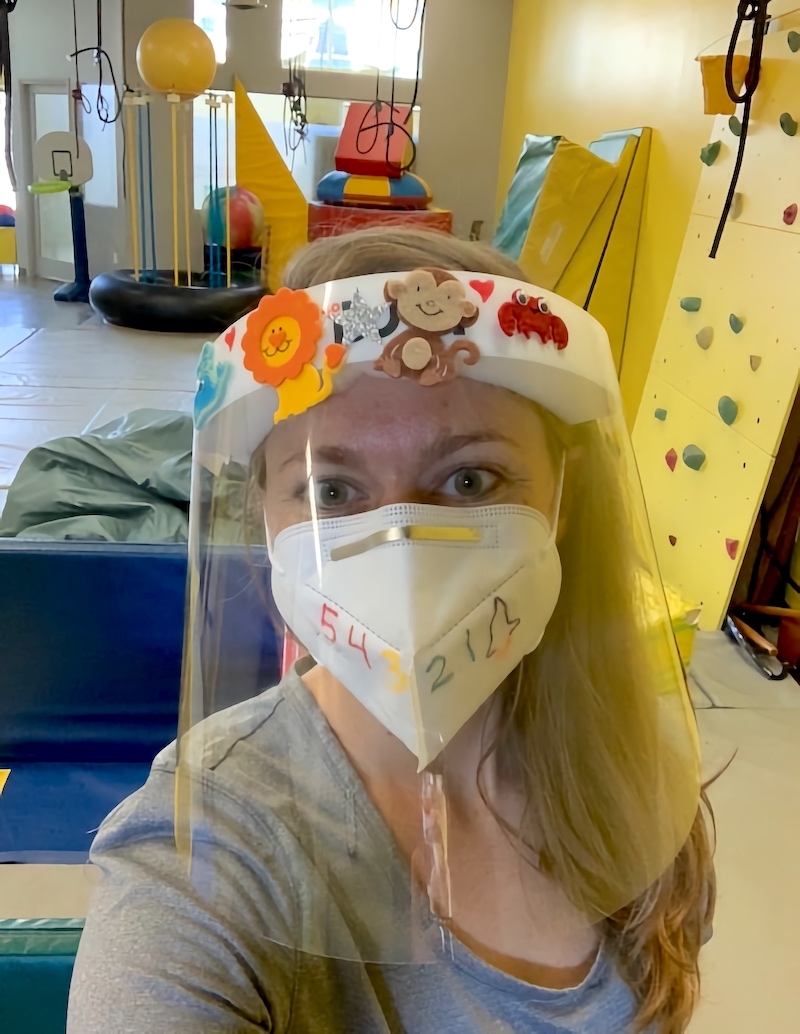
Dani Lurie showing off her decorated face mask and shield that she wears in order to work with children in person at the amid COVID-19.
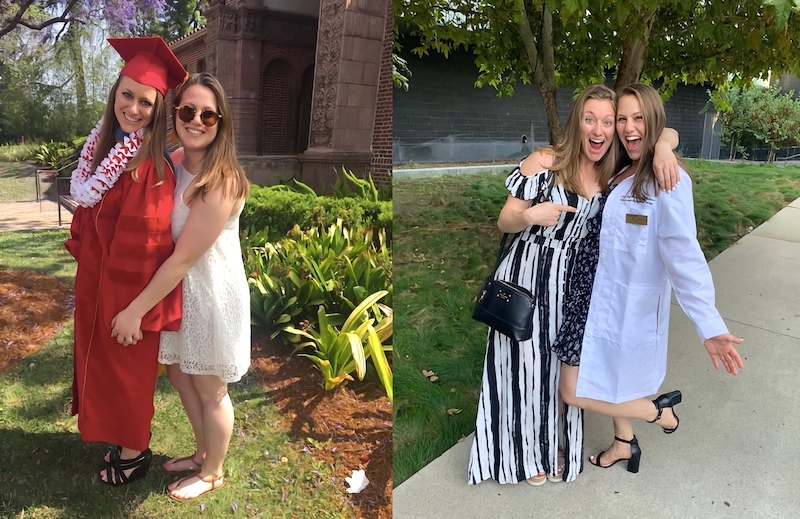
On the left is a photo of me and my sister at her OTD graduation in 2017 and on the right is a photo of us at my White Coat Ceremony in 2019.
⋯

My First Level 1 Fieldwork in Permanent Supportive Housing ⟩
September 17, 2020, by Liz
Fieldwork
The mental health immersion has been by far one of my favorites! Before grad school I had zero experience in this type of setting and I didn’t know what OT in mental health looked like. So, I was excited to learn all about it! A couple of weeks into my first fall semester, I learned that I would be completing my first level 1 fieldwork experience at a permanent supportive housing facility. The residents at this facility were all individuals who were transitioning from homelessness to permanent housing. This is one of the settings that you’ll get a chance to learn about in the immersion.
To my surprise there wasn’t an OT at my site, but I learned SO much. This was because there’s already a smaller representation of occupational therapists working in mental health settings. Fortunately, there were a couple of case managers and an event coordinator present who collaborated with each other to best support the residents. At first it made me really nervous that there wasn’t an OT at my site. I already didn’t know what OT looked like in a mental health context and the fact that it was my first fieldwork experience felt intimidating. However, I will say it was comforting to have one of my colleagues at the same site with me!
The site was relatively new, and most of the residents didn’t really know each other. However, a few of them did from seeing each other at some of the same shelters prior to obtaining housing. On our first day, we knocked on every single resident’s door to introduce ourselves. Even after we introduced ourselves, at first it was difficult for my colleague and I to interact with a lot of the residents. They preferred to stay in their rooms and only came down to the main lobby for coffee or snacks. So, my colleague and I asked ourselves: what would our goal be while we were there? We broke down some of what we had learned in class so far and decided that we wanted to establish a sense of community among the residents. We hoped to promote social engagement and wanted the site to feel like home. And of course we also wanted to encourage the residents to engage in meaningful occupations!
We discussed our ideas with the case managers and event coordinator to make sure it was okay to move forward and they were on board! After receiving the green light, we designed a monthly calendar full of different groups/activities the residents could attend which included gardening, bingo, cooking groups, exercise groups, and computer classes. We also got to use some of the money available in the budget to order some yoga mats, light weights, coloring supplies, and raffle gift cards for bingo.
Every week we would make a new flyer to promote the groups we would be hosting for the day, knock on people’s doors, and invite them to join us. What started with one person attending our first couple of groups turned into more than 10 people joining us! I had the chance to work with one resident who wanted to learn how to use a computer to type up his own songs. He loved music, and I showed him how to use Microsoft Word to type them up. I taught him how to use the internet to search up websites that help you practice typing on the keyboard. I also helped another resident type up a resume. She wanted to go back to work and wanted to get a resume ready. Being able to support these residents engage in activities they found meaningful was amazing.
Over time, some residents felt more comfortable coming down to the lobby even during hours when we weren’t hosting any group sessions. It was an amazing experience also serving as social support for them. Several residents didn’t have any family or friends, while some had simply lost touch with them. On some days we would just sit in the lobby, listen to music and just talk. We were able to order a speaker for bingo that had an aux, so I was able to take some song requests. Billie Jean was a HIT! But, hearing their stories was the best part.
My professional boundaries were also tested while I was at this site. I am a very petite woman, and one of the residents who was also around my size wanted to give me a USC sweater she said no longer fit her. We had talked about this in class and how we may have to make ethical decisions when at fieldwork and in practice. But, I didn’t know making those decisions would come so soon! This woman whom I had established wonderful rapport with wanted to gift me a sweater. How could I decline? I definitely didn’t want her to think it was because I didn’t like it or because it wasn’t brand new. Would this affect our therapeutic relationship? I knew the right thing to do was to decline the gift. So, I explained that I was not allowed to accept any gifts, but that I would take a picture with it and keep that instead. I could tell she was disappointed at first, but she was happy to see that I took a picture with it! This was definitely a difficult decision to make, but an important part of my learning experience.
Overall, I had a great time and learned a lot! As I am writing this blog post I can’t help but think about all of the wonderful residents I met at this site. I am hoping they are all doing well and full of health! If you are a student in the program who hasn’t taken the mental health immersion, I am certain you’ll have a wonderful experience too. And, if you’re a future Trojan you also have some exciting experiences to look forward to!
⋯
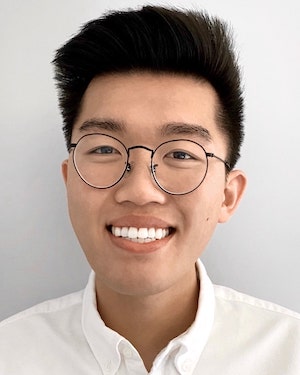
My Mental Health Immersion Experience ⟩
September 7, 2020, by Calvin
Classes Fieldwork
I actually started off in the Mental Health Practice Immersion but, to be honest, I came into it with little to no interest in mental health. I just wanted to get it over with so that I could focus on the pediatric and adult rehabilitation immersions since my previous volunteer experiences were more related to those settings. However, throughout my time in the immersion, my perception of what occupational therapy’s role in mental health was had changed, and I realized that it’s just as important as other OT practice areas.
On the first day of class, I felt really nervous about going into this immersion because it was my first one ever. On top of that, I had no prior experience being in the mental health field, so my knowledge and insight were extremely limited. Nerves had really taken over during the first week, but my course instructors, Dr. Celso Delgado Jr. and Dr. Tessa Milman, were instrumental in reassuring and validating the entire cohort of our feelings. They said that the purpose of this course was to help introduce us to various perspectives so that we could understand the impact of mental health on occupational engagement, as well as the influence of occupation on recovery experiences. They also emphasized that it was okay to be feeling uncertain and sensitive to the experiences ahead, so I went in with an open heart and an open mind.
The mental health immersion incorporates a related Level I Fieldwork experience, in-service training, discussions with experts by experience, team debriefs and so many more opportunities. For my Level I Fieldwork, I was placed at a community mental health site and collaborated with mental health professionals, as well as peer specialists with lived experience. Now, this may sound surprising, but there was actually no occupational therapist at my site. According to the 2015 AOTA Salary & Workforce Survey, only 2.4% of respondents worked in the mental health practice setting. I was definitely shocked by this statistic, but it pushed me to really try and inform my site of the distinct value of OT. However, even with that ambition, I still yearned for guidance from an OT and, towards the beginning, I had a difficult time understanding what occupational therapy’s role was in mental health.
I had this internal conflict where I felt like I had to spread my OT knowledge and make all this positive change. However, I realized that Level I Fieldwork experiences are meant more to be spaces for students to learn, observe, and gain exposure to the area of practice. I also had this perception that OT’s role in mental health was restricted because it seemed similar to what social workers and case managers do. However, I discovered that this isn’t true and that occupational therapy actually plays such an extensive role in community mental health. Although there is collaboration with professionals from other disciplines, OTs have the scope and capacity to address occupational needs, promote functioning in the community, analyze performance skills, and provide unique assessments and interventions. Not having an occupational therapist to guide me through my first fieldwork experience was challenging, but I was grateful for the opportunity to connect curriculum material with my immersive experience. I was also thankful to have had a very involved interdisciplinary team by my side to advocate for the OT profession and they always tried their best to provide me with as many resources as possible!
Finally, I want to talk about my experience with my Cohort B lab team! Within these groups, we did a lot of team-based learning, discussed the course material, interacted with experts by experience, and debriefed about our fieldwork experiences. These people really made my experience in the mental health immersion and I honestly would not have gotten through this without them!
Team CarrOTs! | Pictured from left to right: Dr. Tessa Milman, Tess Mayer, Liz Broske, Bethany Hom, Morgan Smith, Helen Han, Sam Randolph, Adi Nisimov | Picture credits to our Expert by Experience 😊!
My favorite part about this course was the team debriefs, where we would each share about how our different Level I Fieldwork experiences were going. This opportunity opened up a safe space for us to learn about different mental health sites, share our challenges, provide advice and feedback, and just act as each other’s emotional support systems. An expert by experience also participated by sharing their thoughts and perspectives on how to approach certain situations at our respective sites. We were also incredibly grateful to have Dr. Tessa Milman as our team’s faculty supervisor and mentor. They each imparted such extraordinary mental health knowledge and expertise while also providing us with unwavering support throughout it all. These team-based discussions opened my eyes to the various potentials of mental health and how occupational therapy plays a special role in holistically addressing the needs and barriers of individuals experiencing mental health conditions.
This is us after we devoured the food from our Cohort B lunch potluck! Then we immediately went into a food coma haha!
In the beginning, I was nervous to start the mental health immersion because I had no prior experience or exposure. However, through this opportunity, I was able to challenge my implicit biases and build supportive relationships within my team and my fieldwork site. This empowered me to see the bigger picture and to develop a deeper understanding of the connection between occupational therapy and mental health. Regardless of what setting I go into, I know that I will be using my foundation of mental health knowledge in every endeavor I pursue!
Ending this post with appreciation collage for my team! Don’t worry, these pictures were taken during class breaks~
⋯
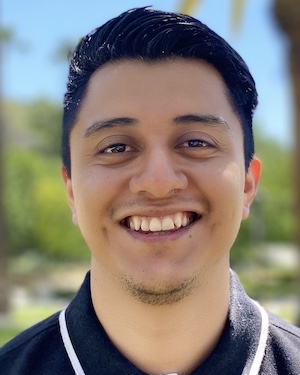
Everything Coming Full Circle This Summer ⟩
August 6, 2020, by Daniel
Fieldwork
This summer began with a lot of uncertainty due to the COVID-19 pandemic. Finding out I would be completing my entire summer fieldwork from home was not what I had planned for. Even after starting fieldwork, I still had hope that things would get better during the summer and that I would be able to work in person at the primary care clinic. However, that day never came and as I write this I find myself completing my last fieldwork week, and the last official week of the Master’s program. After 12 weeks of fieldwork, doing 40+ hours on most weeks, and working as an OTD Student Ambassador, I am ready for a break! Yet, I feel grateful that I was able to continue my education and work from home during this time because that is a privilege.
A big part of writing these blogs is to inform you about my personal experience to help you think about what career path to take after the Master’s program. Reflecting back on this summer at the Primary Care Adult West Clinic, I can honestly say that I feel like I made the right decision by pursuing this OTD Residency. When I was applying to OT school, I remember writing my statement of purpose and having this innate desire to eventually be in a position to help the communities that I grew up in. Below I share with you a piece from my personal statement that has served as my personal motivation throughout the entire OT program and especially during these 12 weeks of fieldwork.
“People from low-socioeconomic backgrounds often do not have income, time, nor access to the health education necessary to receive treatment for various conditions. Even when members from my community are aware of healthcare resources, factors such as work, lack of transportation, immigration status, language barriers, and no insurance prevent them from addressing their health needs. For example, during my introductory experience completing occupational therapy volunteer hours, I became a de-facto translator for Latino families who admitted that they felt more comfortable receiving care from someone with whom they could clearly articulate their health concerns.”
Reading this now and thinking about my clients at the primary care clinic brings me a lot of joy. I feel very lucky that every day I get to work with the communities that I dreamed of helping while applying to OT school. Like any other person, there are days where I feel tired, less motivated, or just out of rhythm, but then I will have a conversation with one of my clients from the clinic and it reminds me just how much they appreciate the support OT provides. When talking to clients, they often remind me of my parents, my grandma, my aunts, and my neighbors. People that are trying to navigate such a complex healthcare system, simply trying their best take care of themselves and their families, while they are impacted by social, political, and economic factors. As someone that grew up in a low-income, Latinx immigrant family, with parents trying to make ends meet, the experiences of many of my clients hit home for me. This helps me push through on those difficult days and motivates me to always do my best to connect them with any resources that can help them.
This summer has helped me learn a lot about myself and as I mentioned it was a good reminder of the reason why I came to OT school and decided to continue with the OTD. I am excited about the future as I look forward to learning and collaborating with others to better serve this population at the Primary Care Adult West Clinic. Lastly, I just want to give a special shout out to the entire Adult West clinic team, Dr. Diaz, Dr. Pyatak, Dr. Granados, and soon to be Dr. Elissa Taylor, who supported me this summer and prepared me with the necessary skills to take over the caseload at the clinic as the new OTD resident.
My advice to students applying to the OTD is to think about the things you are passionate about. If needed, take a step back and think about why you applied to OT school in the first place, what do you want to get out of the OTD, and what do you see yourself doing in the future. Remember that your OTD does not necessarily define what settings you end up practicing in. However, you want to make sure that adding an extra year to your education will be a pleasant experience, and an opportunity that will motivate you to want to show up every day and do the work to help others. Finding the right fit will be essential when looking at potential OTD residency opportunities, whether they are Chan affiliated or not. And if that takes a little bit longer than you expected, than that is totally okay. Don’t be afraid to reach out, be curious, take your time, and ask questions!
⋯






